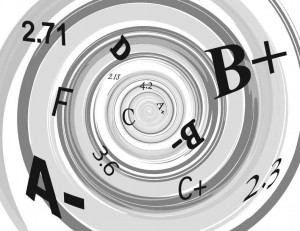Education system should cultivate learning
A week ago, on April 14, students, teaching assistants and faculty gathered for a town hall meeting with the Center for Excellence in Teaching to discuss grade reformation and the establishment of a universal grading policy at USC. They reached no verdict on the best solution.
American institutions of higher learning attempt to emulate those of ancient Greece, whose famous thinkers transformed the world. Yet our grading policy and general educational structure fails to cultivate the desire for knowledge that the ancient Greek thinkers embraced.
To overcome this deficiency, USC should adopt a policy of apprenticeship in course progression as opposed to distant and imperfect grading scales that fail to measure students’ potential.
Ideally, every college student would dedicate their careers to learning while professors would devote their livelihood to seeking knowledge and passing it on to the next generation. In this situation, grades are unnecessary.
Grades were created because of a lack of dedication to learning; they provide an incentive system with schools and society. Higher grade point averages mean progression within the system and supposedly imply success.
The GPA system provides an indicator of success and plays a significant role in our school and career progress. Thus, grades often motivate students to study for testing purposes rather than learning purposes. It is the classic argument against standardized testing in education.
If we have grades, the criteria should be clearly articulated by the university, not relative to others, and be defined by the amount of knowledge the student acquires and pursues.
For example, an A might consist of a display of curiosity that seeks knowledge above and beyond the given material. A letter B grade might represent high comprehension of the material presented in coursework. Anything less would be beneath the classroom standard.
In this setting, a professor might give an exam with 70 percent of the questions directly from the coursework and 30 percent of new knowledge, relevant to the course yet not taught in class. This would encourage students to engage and comprehend the course subject matter rather than simply regurgitating facts for testing purposes.
However, the ancient Greek thinkers did not have a grading system. Their knowledge-hungry culture was incentive enough.
In their system, students were passed from teacher to teacher as they mastered the material, similar to how someone moves from algebra to calculus. But the teacher and student had a sincere relationship, similar to that of a mentor-apprentice.
The teacher knew the strong comprehension capabilities of the students based upon their close interactions, not by the grades they received in class.
This concept is familiar to universities, yet poorly incentivized. USC professor of philosophy Dallas Willard acknowledged this issue in Jim Nelson Black’s book Freefall of the American University when he said, “The reward for faculty members who do good work is more research and less teaching,” he said.
This system diminishes capacity for student-professor relationships and apprenticeships.
Professors know what is necessary for students to advance in the school system and be able to decide whether to pass the students forward, similar to the power of teachers in grade school. But since students are more mature, they have the opportunity to contribute to the course instruction as well, creating an engaging, two-way dialogue.
One imperfection of this system could arise when a professor and student relate poorly. Hopefully, a professor would be mature enough to still see and nourish potential in this student. But if this fails, a student can still approach the next professor to display his knowledge and readiness.
Implementation of this system could bar students from progressing and even graduating. Such a scenario might force students to change majors or transfer. However, barring slacking students from obtaining a degree would increase the value and credibility of a USC degree.
This “apprentice” system would also attract high-quality, knowledge-hungry students much more than a standard grading system. Professors would also be permitted to take students much deeper into the material.
Since graduate schools and employers often require a look into a student’s performance record, grades could be maintained in a system hidden to students similar to that of St. John’s College. The school employs a progression system that is highly relational with private oral exams and discussions between students and professors each semester. The college records grades for students, but does not report them to students unless they are requested. If USC adopts the apprentice organization, professor recommendations would assure the quality of students to graduate schools.
The CET should investigate this sort of apprentice system, creating tighter bonds between students and faculty and cultivating a knowledge-seeking student body. Professors can implement a new testing system that includes questions requiring self-learned information on the course topic to better distinguish between knowledge-seeking students and otherwise.
In adopting this structure, USC would establish a new method of learning among universities while becoming an elite learning institution that trains students to think and learn rather than to test and pass.
Jensen Carlsen is a senior majoring in economics and mathematics. His column “The Bridge” runs Wednesdays.

